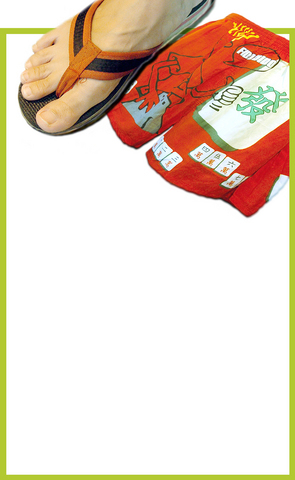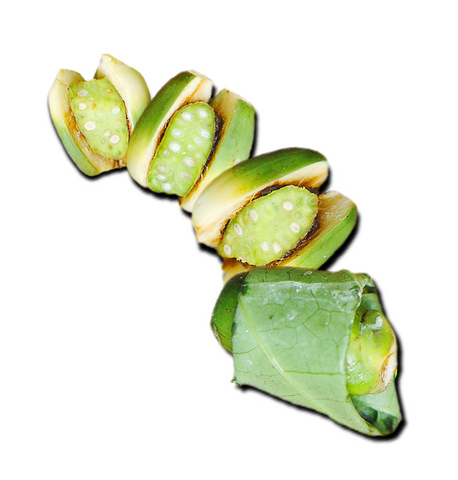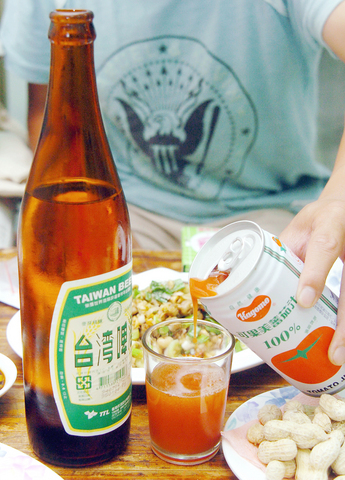A woman walks into a 7-Eleven wearing plastic slippers, jeans under a short skirt, an "Abibas" shirt and her motorcycle helmet. She purchases a bottle of rice wine, several cans of Vitali, and a pack of Long Life cigarettes, gets on the back of a scooter already occupied by three family members and rides away.
Though this scenario is an imagined one, it's no stretch of the imagination. It is a stereotypical look at the habits of a few Taiwanese people's habits and behavior. This was sometimes encapsulated by the term taike (
But while the slight hasn't completely lost its sting, it has been soothed by the surging popularity of Taiwanese culture. "Taike" has entered the lexicon of cool.

PHOTOS: CHANG CHIA-MING, TAIPEI TIMES
In their current issue, the editors of Eslite Reader (
It claims taike as a term is not anti-Taiwanese, but instead can be embraced as an integral part of local culture and another aspect of bentuhua (
"Some people have told us that if we talk about it, we're still making fun of it," said Sophie Chiang (

It wasn't always thus. When the KMT supporters first arrived in the country they were often ostracized by locals who felt oppressed by the government that had taken charge of the island. The KMT supporters, many of them soldiers, were seen by Taiwanese as tang shan zi (
To the new arrivals, locals became taike, literally "Taiwanese guests." This was the sociopolitical pressure cooker that would simmer and occasionally come to boil over the next decades, alleviated by the end of martial law nearly 20 years ago and democratization.
To what degree time has tempered those ill feelings depends on who you ask, but it has certainly altered the semantics of the situation. For today's generation of young people in particular taike is more likely to be used playfully, rather than used as an insult.

It has even been co-opted by some who embrace the stereotypes. Wu Peng-feng (
"It depends on who's talking and how they say it," he said. "If it's a young person, they probably don't mean it as an insult. But if it's an older person, it could be impolite. It depends on their tone."
Like others interviewed for this article, Wu shied away from offering a description of the term, saying instead that one simply knows it when one sees it.
Examples that were offered by others included: The cup wedged between the seats of a cab for the driver to spit betel nut; watermelon dipped in soy sauce and wasabi; the ubiquitous sausage-seller; hometown rock hero Wu Bai's (
Chiang said their decision to write about "new taike", as they call it, was based in part on the many Web sites that discuss the stereotypes.
"Some [of the Web sites] say it's discriminatory and other say it's still a little bit insulting," she said. "But at the same time there are celebrities who imitate taike." Rather than making fun, she said, they're emulating attributes they find cool.
Advertising, too, has targeted the stereotypes to sell everything from energy drinks to banking services.
"Taike is being released from its stereotypes and becoming a lifestyle term," Chiang said. "To embrace it, you maybe accept a more liberal lifestyle or you are bolder or braver. ... It's about the power of naming and identity," she said, and the fact that we control what words mean.
Still, there are places where plastic slippers aren't seen as a fashion statement. Signs outside nightclubs often proscribe chewing betel nut or blowing whistles and warn that anyone wearing slippers will be refused entry.
Chiang prefers to see the current debate in a broader context. Despite Taiwan's 400 years of history, she said, colonization and political upheaval have made for interesting times.
"Everything has happened here very quickly," she said. "The essence of being Taiwanese is change. Taike, too, is changing in context."
△ Look for the Taike Rock and Roll Concert (台客搖滾演唱會) to take place on Aug. 19 and Aug. 20 at the Taipei International Convention Center, with headliners Wu Bai and China Blue, MC Hotdog, Zhang Zhen-yue (
△ For more information on tickets and what it means to be taike, visit http://www.bcc.com.tw/all_net/news/tsong/tsong.htm.

As Taiwan’s second most populous city, Taichung looms large in the electoral map. Taiwanese political commentators describe it — along with neighboring Changhua County — as Taiwan’s “swing states” (搖擺州), which is a curious direct borrowing from American election terminology. In the early post-Martial Law era, Taichung was referred to as a “desert of democracy” because while the Democratic Progressive Party (DPP) was winning elections in the north and south, Taichung remained staunchly loyal to the Chinese Nationalist Party (KMT). That changed over time, but in both Changhua and Taichung, the DPP still suffers from a “one-term curse,” with the

William Liu (劉家君) moved to Kaohsiung from Nantou to live with his boyfriend Reg Hong (洪嘉佑). “In Nantou, people do not support gay rights at all and never even talk about it. Living here made me optimistic and made me realize how much I can express myself,” Liu tells the Taipei Times. Hong and his friend Cony Hsieh (謝昀希) are both active in several LGBT groups and organizations in Kaohsiung. They were among the people behind the city’s 16th Pride event in November last year, which gathered over 35,000 people. Along with others, they clearly see Kaohsiung as the nexus of LGBT rights.

Jan. 26 to Feb. 1 Nearly 90 years after it was last recorded, the Basay language was taught in a classroom for the first time in September last year. Over the following three months, students learned its sounds along with the customs and folktales of the Ketagalan people, who once spoke it across northern Taiwan. Although each Ketagalan settlement had its own language, Basay functioned as a common trade language. By the late 19th century, it had largely fallen out of daily use as speakers shifted to Hoklo (commonly known as Taiwanese), surviving only in fragments remembered by the elderly. In

Dissident artist Ai Weiwei’s (艾未未) famous return to the People’s Republic of China (PRC) has been overshadowed by the astonishing news of the latest arrests of senior military figures for “corruption,” but it is an interesting piece of news in its own right, though more for what Ai does not understand than for what he does. Ai simply lacks the reflective understanding that the loneliness and isolation he imagines are “European” are simply the joys of life as an expat. That goes both ways: “I love Taiwan!” say many still wet-behind-the-ears expats here, not realizing what they love is being an